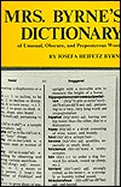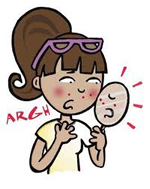By Doc Larrick, first published March 3, 2016 in the Dynamic Literacy newsletter
I had the great fortune for many years to enjoy conversations about words with my grandmother, bright-eyed and witty to the day she died at age 96. Not only was I listening back in time to language usage from the early 1880’s throughout the first 75 years of the twentieth century, but–even more astounding–my grandmother had learned much about words and English usage from HER grandmother, who had been born in 1803!
And so on many occasions I would look up a word that my grandmother had casually used and find the entry was marked obs., or, as I came to discover, obsolescent–going out of modern usage. There are hundreds, even thousands, of words that were once commonly used in English but have all but disappeared (or dis-sounded) from the language.
| I’m not going to entertain you (for now) with the joy of such words–for that, let me direct you to two wonderful resources: Mrs. Byrne’s Dictionary of Unusual, Obscure, and Preposterous Words, by Josepfa Heifetz Byrne (1974), and The Word Museum: The Most Remarkable English Words Ever Forgotten, by Jeffrey Kacirk (2000). |  |
Instead, I’ll share with you a word family revealed in the suffix of obsolescent, using WordBuild’s greatest strength: using familiar words to enlarge your vocabulary without having to memorize useless word lists.
 |
So, if obsolescent means “becoming obsolete”, what, for example, is adolescent? An adolescent, it turns out, is someone “becoming an adult.” A convalescent is someone who is “becoming strong (valid)” again.
|
Observe how the meanings of these –escent adjectives become clearer as you associate other, more familiar, words with them:
| iridescent | becoming like the RAINBOW, or the iris |
| luminescent | becoming LIGHT, or illuminated |
| senescent | becoming OLD, or senior or senile |
| tumescent | becoming SWOLLEN, or like a tumor |
| rubescent | becoming RED, like a rubric or rubella (measles) |
| liquescent | becoming LIQUID (melting!) |
| mollescent | becoming SOFT, like a mollusc |
| There are over 40 other -escent adjectives in modern English usage (to say nothing of ones who have become obsolete). And, they all can turn into nouns by changing -escent to -escence. For example, something phosphorescent has the quality of phosphorescence. |  |
But wait–there’s more. Every one of these can be turned into a verb by changing the -escent or the -escence simply to -esce. For example, things that are opalescent have the quality of opalescence, and what they do as they become a shimmering display of color is to opalesce. By the way, all such words, having the suffixes -esce, -escent, or -escence, have a name. They are called INCHOATIVES, or words indicating the process of beginning. If you feel as if you’re getting an inchoative love for obsolete words, just say, “Thanks!”
